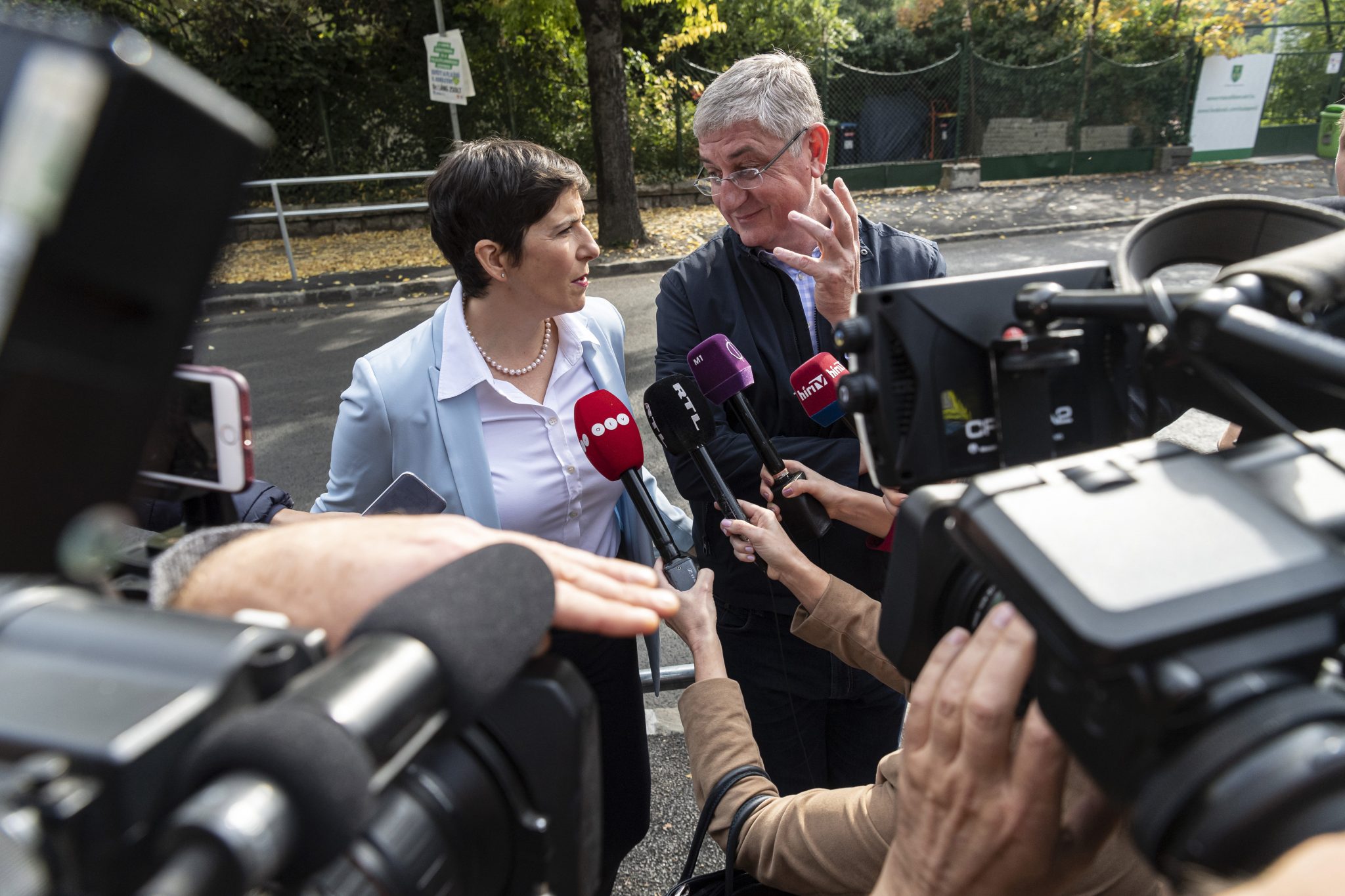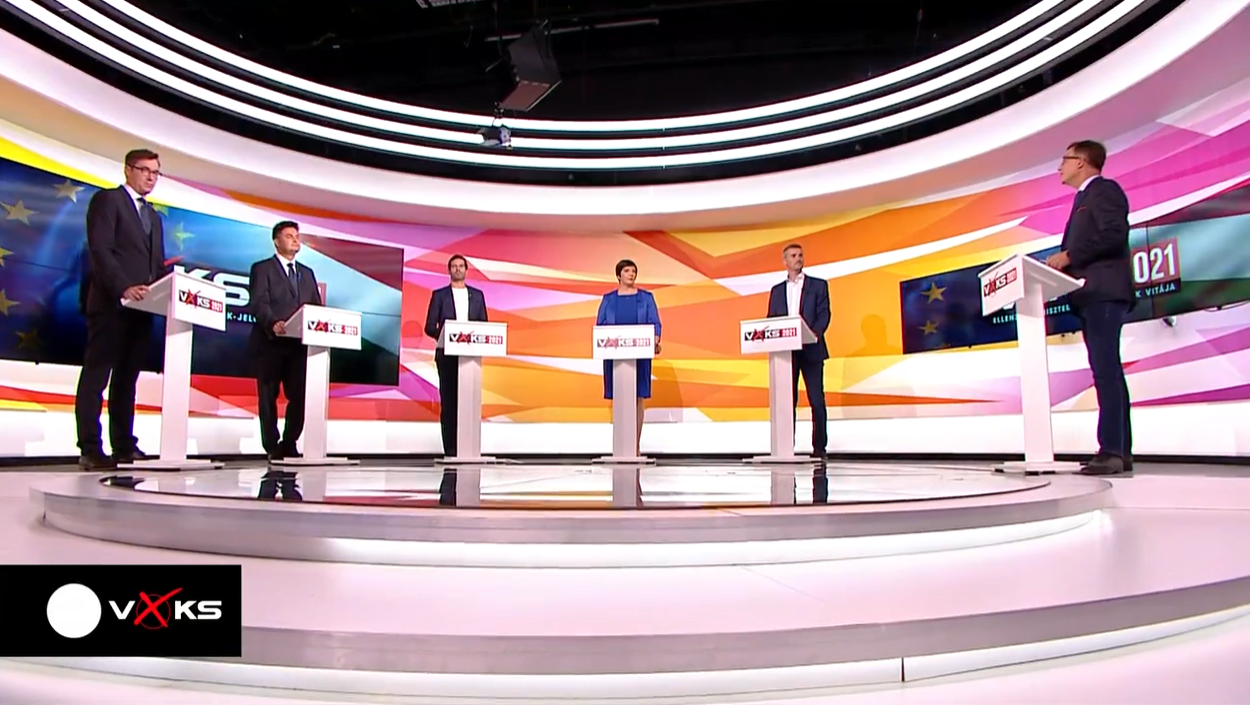
A horse head, leaked recordings, menaces are all on the menu.Continue reading

The first debate between the opposition parties’ prime-ministerial candidates was held Sunday night. Besides only one minor verbal clash, the candidates tended to be in harmony regarding the Orbán administration’s accountability, “unjust” taxation, and the improper working of the healthcare and education systems.
Five candidates entered liberal-leaning ATV’s studio Sunday night: Gergely Karácsony (of left-liberal Párbeszéd, also backed by Socialist MSZP and centrist green LMP), Klára Dobrev (of left-liberal Democratic Coalition- DK), Péter Márki-Zay (of conservative Hungary for all Movement), Péter Jakab (of right-wing Jobbik), and András Fekete-Győr (of centrist-liberal Momentum).
Candidates were first asked about their potential first week as prime minister. Jakab would repeal a series of laws that let [Orbán’s System of National Cooperation] NER be set up, replace a number of state leaders, “send [Chief Prosecutor] Péter Polt to prison,” and improve the healthcare system with “life-saving interventions.”
Márki-Zay would “liberate” the prosecution and the judiciary from the “party-state oppression,” and restore the local governments’ autonomous work to improve the healthcare system.
Karácsony’s main goal would be to “reunite Hungary,” but one of his first measures would be to block the bank accounts of those who have enriched themselves through corruption, and he would not forget to declare the Constitution invalid under public law.
Fekete-Győr would set up an anti-corruption prosecutor’s office in the first week to begin enforcing accountability. More generally, he also promised a change in political culture, “human-scaled politics,” and the restoration of press freedom.
Meanwhile, Dobrev would prepare a “hefty package of laws” for the very first session of the new parliament, including accountability, personnel changes, and budget amendments.
Dobrev promised “fair wages” and support for small and medium-sized enterprises.
Jakab promised “more money for workers,” the restoration of the service pension, and pension rights for men after 40 years of service. He would also cut VAT on basic foodstuffs (from 27 to 5%), and for products needed for childcare and pensioners.
Karácsony promised a net minimum wage of HUF 200,000 (EUR 573), which the government is about to introduce in gross terms, but he would also introduce a social minimum of HUF 100,000 net (EUR 286) per month. He also promised a tax increase, but not for those earning around or below the average, rather for the wealthiest, and a special tax on assets worth more than half a billion forints.
Márki-Zay also promised wage increases, which he said there was money for, only “one shouldn’t steal it.” He would also favor VAT cuts, but in response to Karácsony, he also said, “the money that is being saved should not be taxed, but confiscated.”
Fekete-Győr would introduce a four-day work week, an individual pension account, and the euro.
All candidates called for urgent improvements in both areas. Fekete-Győr said it would be worthwhile to involve private providers in the healthcare system. As for education, he would introduce a minimum net monthly teacher’s salary of HUF 255,000 (EUR 730) and said that the Finnish model should be adopted.
Dobrev said that thousands of new specialists, hospital doctors, and general practitioners were needed, and there is a shortage of staff in education as well, where even a starting teacher in Romania earns HUF 30,000 more.
Jakab would not only raise teachers’ salaries, but also the age of compulsory schooling to 18, and spend an extra HUF 600 billion (EUR 1.7 billion) a year on healthcare. He would “correct” some features of the controversial anti-LGBT+ law (or “child protection law” as the government began calling it) that stigmatizes homosexuality. On the other hand, he wouldn’t even rule out chemical castration for pedophiles.
Márki-Zay noted that under the 11-year-long Fidesz rule, education and healthcare have become disaster areas.
Karácsony promised a 50% wage increase for healthcare workers and he also supports the involvement of private healthcare. As for education, instead of the Finnish example, he would instead go for the Polish one, and would give teachers in disadvantaged districts a wage supplement and reinstate the management of schools to individual municipalities.
All of the candidates set a strict tone in connection with the affluence of Fidesz politicians and Fidesz-linked businesses, both financially and legally. According to Karácsony, halting corruption is easier than many would think: since the current system’s essence is public money’s continuous flow, he believes that it can be stopped simply by “shutting off the taps.” The system is held together not by law but by money, he said, and promised a new common constitution, confirmed by a referendum.
Fekete-Győr has made some specific proposals on the issue: he would punish those who lie in asset declarations, and those who expose theft would receive special protection. He would maximize the prime ministers’ time in office to eight years, and would launch a “Felcsút trial” (Orbán’s home village).
Dobrev called for challenging the ‘two-thirds laws,’ even if they had been passed legally, otherwise there would be no way to challenge issues like Fudan or Paks II.
Jakab also voiced a number of specific promises: he would recover the money obtained through corruption by imposing a 99% special tax if no other way is possible, and would abolish politicians’ immunity. Also, he wouldn’t allow politicians and their families to apply for state or EU money.
Márki-Zay believes that “the main culprits should be put in jail,” accountability should be enforced. In addition, in his view, not only the last 10-11 years should be investigated, but rather the past 30 years (that includes the left-liberal governments’ rule too).
According to perhaps the most-respected Hungarian political analyst’s comments, all of the candidates remained faithful to the image they previously depicted themselves as. Besides warning against overvaluing the significance of such debates, Gábor Török highlighted that Jakab stayed true to his image coming from the countryside, using an ordinary tone and harshly confronting the ruling parties.
Meanwhile, he believes Karácsony wished to be the ‘integrative’ common denominator while Dobrev thrived to depict herself as a wise politician, someone who can not only beat Orbán but suitable to govern too. Fekete-Győr wishes to be the ‘new kid on the block,’ therefore more open to confrontation. And Márki-Zay apparently aims to be the outsider who also regularly criticizes Ferenc Gyurcsány’s (whose wife is Dobrev) rule and aims to address, involve, and integrate right-wing, conservative voters too.
Two more such debates will follow Sunday’s (both to be hosted by tv channel RTL Klub). The next one is scheduled for September 24th, two days before the first round (held between September 18-26) of the primaries are due to close. A third debate, to be organized only for the three ‘finalists,’ is set to be held somewhere between October 4 and 10. The participating opposition parties promised the announcement of a final PM candidate to go against Orbán and MP candidates to go against the relevant Fidesz-KDNP politicians in the constituencies by October 23rd.
In addition to these three major shows, Partizán, a YouTube channel led by leftist activist Márton Gulyás, regularly broadcasts the debates of the opposition’s local MP candidates. In a minor controversy, Partizán wished to host the PM-candidates’ debate too, which didn’t happen despite differences in the target audience and Partizán’s popularity.
featured image: (from left to right) Karácsony, Márki-Zay, Fekete-Győr, Dobrev and Jakab; via Youtube